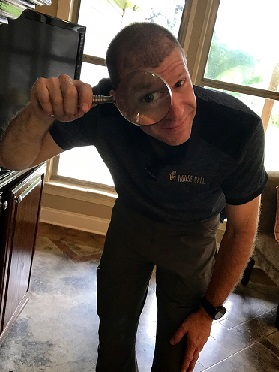Often, when starting out in a new small business, we run into problems. One of our biggest problems happens to be figuring out what type of clientele we want to deal with in our business. There are always two different type of potential clients available to sell our services to: professionals and amateurs. Unfortunately, because we’re just starting out in the business world, we don’t have the knowledge or experience to know the difference.

So, what’s the difference between a professional and an amateur client? Do they look a certain way? Is it the vehicles they drive? Is there some tell-tale sign that will let us know which clients to pursue and which ones to flee from?
A professional is looking to make a purchase from another professional. They’re going to have experience and knowledge. They’re going to know what they’re looking for in a product. They’re going to have a well-worn process that they follow when they need to make a purchase. They’re not going to think that they can do your job themselves, and they aren’t going to wait until the last minute, turning everything into a stress-filled situation.
At the other end of the spectrum is the amateur client. The amateur won’t have any of these well-worn processes to follow. They’ll have nothing to compare your services to. They’ll have no idea the education and experience required to do your job. They’ll have no sense of the value that you bring to the table. They’ll think that they can do your job themselves. Why would they want to pay the price you charge for your service, when obviously your job is so simple that anyone could do it?
Professionals have an established team that they rely on to get them to the finish line. Amateurs fly by the seat of their pants. Professionals only deal with other professionals, people that won’t stand in the way of progress. Amateurs ask other amateurs for advice.
In the business world, established companies are able to take a long-term approach in developing relationships with other professionals. Beginners, unfortunately, typically don’t have the luxury of playing the long game. The very existence of their business is a crap-shoot; their viability is on the clock. This means that beginners are often forced to work with amateurs.

That’s not to say that a business can’t have success working with amateurs. You can, but you need to go into every business transaction with your eyes wide open, on the alert for the tell-tale signs of problems. Because, after all, you’re going to be working with an amateur.
So, when you don’t get that job, it may not be because of what you said or what you did when you were talking to that amateur. It may work out that way simply because you’re having to deal with amateurs in the first place. Or maybe the person that you though was a professional turned out to really be just an amateur in disguise.
In the midst of chaos, there is also opportunity,
Sun-Tzu
So, the question then becomes, how do I get these professional clients? Is it simply a matter of waiting until I’ve become more professional myself, through years of education and experience, or is there something I can do to shorten the learning curve?
In any industry, there’s always things that can be done to shorten the curve. The tough question, the one that always separates the amateur from the professional business owners, is always the same:
Are you willing to put in the work?
Getting better clients is really easy and incredibly difficult, all at the same time. It involves not only doing a great job right now but making sure you’re prepared to do an even better job in the future. It’s easy to decide that you’re where you need to be, being content with your product, education and experience. It’s a blow to your ego to admit that you’re not the best widget maker that’s ever lived. It’s hard to admit that you don’t know everything and then vow to keep getting better. It takes a lot of character to admit that you don’t know something, and even more to decide to put in the time to learn something new.

Your future business prospects are based on the work you’ve done in the past, as well as the pride you put into your product. How much you care about your reputation, how much love you have for your work, and how much you value the well-being of your clients over the value of your bank account is easy to see. It shows through in your product, in your website, in your marketing and in your life.
When you’re good at your job, your marketing and your persona, you’re more likely to have better clients. And, according to Seth Godin, the benefits of having better clients is very clear: “They challenge you to do better work, they talk about you and your work, they pay on time, they want you to do work you’re proud of and they’re motivated to do more than most people expect.”
The hard part is putting in the work that’s required to become the sort of business that professional clients seek out. There’s a way that you can optimize your sales pitch to attract professionals. There’s a way to better your product to discourage association with amateurs. But they both involve time and experience, and having to spend that time gaining experience while dealing with all those amateurs.
Just be sure to keep your eyes open while you’re doing it.
This post is based on blog posts written by Seth Godin. For more info on Seth, visit http://seths.blog
I welcome all feedback (both positive and negative) on this post. Please take a moment to leave a comment below. Thank you!
Want to be an Influencer in Your Field? Share This Post!
Thanks, Joe

